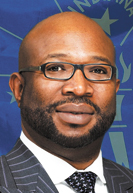Subscriber Benefit
As a subscriber you can listen to articles at work, in the car, or while you work out. Subscribe Now
For the past three years, lawmakers have taken up a host of controversial issues, from a near total abortion ban and potential book bans to a dramatic expansion of the state’s private school voucher program and proposed limits on what can be taught in classrooms.
Republican leaders in the Indiana General Assembly say not to expect the same level of heated debate in the 2024 legislative session. Instead, look for lawmakers to “tweak” and “fine-tune” existing laws.
Also tamping down expectations this year is a new rule that limits each lawmaker to five bills. Committee chairs can file up to seven bills.
“I’ve tried to get people to measure expectations for the session,” House Speaker Todd Huston, R-Fishers, said recently. “Quite honestly, we’ve had three aggressive sessions—three years in which we accomplished a lot. I don’t remember what the 2020 session felt like. It had to feel more normal than the last three, so I’m kind of striving for that goal. And we’ll probably take a pretty measured approach on what we address and what we attack.”
“Short” legislative sessions held in even-numbered years are intended to be for emergencies only, Huston said, while acknowledging that lawmakers have in recent years “expanded the definition” of what meets that threshold.

Next year’s session is slated to begin Jan. 8 and is required by law to end by March 14.
Democrats are hoping social issues remain off the table.
“We’re going to be in a defensive posture,” said Senate Minority Leader Greg Taylor, D-Indianapolis. “Hopefully, we’ll get some support from the other side of the aisle to keep those issues out of the agenda.”
With many lawmakers facing reelection challengers in 2024, there is reason to believe they won’t want to stir the pot much.
Here’s a look at some issues the General Assembly is expected to take on in 2024.

(IBJ photo/Eric Learned)
Work-based learning
Look for lawmakers to expand on work-based learning experiences that were created as part of House Bill 1002, a sweeping 2023 education measure that created a career scholarship account program, allowing students to receive up to $5,000 toward technical coursework and credentials based on their career aspirations and interests.
Critics of the legislation, which included the Indiana State Teachers Association and public education advocates, argued that Indiana should do more with its existing career and technical education programs that have been in schools for years.
In September, a group of influential Hoosiers in business, government and not-for-profit and education leadership took a trip to Switzerland to gain insights from the European nation’s globally recognized education apprenticeship program.
“We started on that road with HB 1002, and there may be some changes or tweaks to legislation that we might use this year,” said Senate Pro Tem Rod Bray, R-Martinsville. “The idea or the advantages are—as I see it—you take a 16-year-old and you keep them in class on some level, but you also give them an apprenticeship where they go into the workplace and start to work.”
Boys in particular stand to benefit from a work-based learning approach, said Senate Pro Tem Rod Bray, R-Martinsville.
“There are a lot of kids that get lost in that space there, and I think this apprenticeship program has tremendous potential to kind of keep those folks engaged,” he added. “If you look at 18- to 23-year-old males, those are some of the people that we cannot get into the workforce. I think it shows great potential.”
The Indiana Chamber’s most recent annual employer survey showed that an increasing number of businesses are reporting that they’re using a “skills-based hiring process” to find workers.

Project labor agreements
The Indiana Chamber is asking lawmakers to do away with project labor agreements, which shut out nonunion workers from participating in construction projects supported with taxpayer dollars.
Earlier this year, a bill to restrict the agreements failed to make it out of committee. Expect that effort to resurface, Bray said.
“I don’t know that our caucus is settled on that issue. It’s certainly been part of the conversation for the last couple years and will be again.”
Democrats oppose doing away with PLAs, which they say ensure that qualified workers and contractors are hired to do work for municipalities.
“It’s kind of interesting that, whenever we’re talking about these PLAs, we’re focusing on the fact of who’s going to provide the labor,” said Taylor, the Senate minority leader. “I always thought that we were a conservative state that kind of let the market dictate what’s going to happen.”
House Minority Leader Phil GiaQuinta, D-Fort Wayne, said he “never really understood the controversy over something that’s an option” for municipalities, rather than a mandate.
“It’s an option. No one’s saying they have to do this, but if they want to, why not let them?”
Driving privilege cards

Sen. Blake Doriot, a Republican from Goshen, said he intends to partner with Sen. David Niezgodski, a Democrat from South Bend, to revive a bill that would allow the 100,000 immigrants living in Indiana without legal permission to lawfully operate a motor vehicle.
Sixteen states and the District of Columbia have already passed legislation that allows people living in this country illegally to obtain what’s known as a driving card. This allows them to receive proper driver training and show proof-of-driving qualifications without having to show proof of lawful status in the United States. Illinois is the only Midwestern state to have such a law.
“I think this is a bipartisan issue, and David and I are good friends, and we believe in this,” Doriot told IBJ.
Despite support from both political parties and the Indiana Chamber, the measure has failed to advance in past sessions.
Adam Berry, vice president of economic development and technology at the Indiana Chamber, said driving privilege cards will improve public safety and give Indiana residents in the country illegally a greater sense of security. It would also allow such residents to obtain auto insurance.
“What we’ve seen in those states that have similar legislation are fewer hit-and-run accidents, better interactions with law enforcement, and 75% of the undocumented drivers in those states have auto insurance,” Berry said. “This is an issue that the Indiana Chamber has and will continue to champion for the foreseeable future.”
A summer study committee in 2022 was tasked with studying the idea but offered no recommendations.
Water regulation
A controversial plan to pump as much as 100 million gallons of water per day from aquifers connected to the Wabash River in Lafayette to a high-tech manufacturing park in Boone County could lead to legislative intervention.
The Indiana Economic Development Corp., the public-private state agency overseeing development of the LEAP Research and Innovation District, has been conducting engineering and design studies to determine whether such a project is feasible. LEAP stands for Limitless Exploration/Advanced Pace.
Lafayette-area residents, including elected officials, are deeply concerned about the lack of government review called for in state law regarding such massive water withdrawals and the impact such a project could have on their water supply.
Reps. Sharon Negele, R-Attica, and Spencer Deery, R-West Lafayette, plan to file legislation that would require groundwater withdrawals of at least 10 million gallons of water per day—that is then transported to a destination beyond the aquifer surface area—to receive approval through a permitting process regulated by the Indiana Department of Natural Resources.
Large withdrawals would also require public hearings and written feasibility studies that would have to be peer-reviewed by an expert in water resource hydrology, with the Natural Resources Commission becoming the permitting authority.
Whether the legislation has the support of Republican leadership remains unclear. Both Bray and Huston said the state isn’t planning to move forward with the project until more data is gathered.
More reading, less skipping
Next year, lawmakers intend to continue to address literacy issues while also taking aim at chronic student absenteeism.
Indiana’s 2023 IREAD-3 results showed that nearly one in five students—close to 14,000 pupils—is unable to read proficiently by third grade.
During the 2023 session, lawmakers passed legislation mandating that schools teach “science of reading,” a method that incorporates phonics, fluency, vocabulary and comprehension, giving students the ability to deduce the meanings of words they don’t recognize.

Rep. Ed DeLaney, D-Indianapolis, said Republican control of education policy has contributed to the problem.
“They need to acknowledge that excessive testing and ever-changing ‘reform’ isn’t the answer,” DeLaney said. “Reading proficiency is a critical predictor of future academic success or struggle. House Republicans must take responsibility for the continued decline in reading proficiency.”
Holding back third grade students who are unable to read isn’t the answer, either, DeLaney said. Currently, Indiana law requires retaining students who don’t pass the state reading test unless they meet certain criteria.
Instead, schools need to be provided with more resources, including more teacher’s aides and increased incentives, he said.
Lawmakers also hope to address truancy. An October report from the Indiana Department of Education found that about 20% of students are defined as chronically absent—missing 18 or more days in a school year.
“We’ve got to try and figure that out, because those numbers are getting bigger and bigger,” Bray said. “It’s not difficult at all to make the connection between that and poor performance in school.”•
Please enable JavaScript to view this content.


What are the odds that Republicans are trying to avoid addressing issues where there is a juxtaposition of Hoosiers’ wants & the the wants of the Republican establishment? Avoiding issues like abortion & marijuana all-together might make 2024 elections easier for Republicans.
Based on this year’s municipal elections, public polls, and the actions of Indiana’s neighboring states & peer states, Indiana probably went too far with its abortion restrictions. Especially considering how referendums in other states with similar demographics have gone. It’s a bad look for the legislature, but depending on how pending lawsuits are resolved by the Indiana Supreme Court, they might get bailed out. If abortion restrictions were loosened by judicial action, statehouse Republicans would lose some heat while simultaneously being able to tell their evangelical constituents that they tried.
Marijuana legalization is in a similar boat. Indiana is way behind the curve, and probably behind popular opinion.
Anyway, I’d consider the ’24 session a success if Aaron Freeman’s bills fail to pass their assigned committees.
It’s a compelling case for yearly elections.
“…what we attack.” Interesting choice of wording.
Legalize that weed or Gtfoh!! No more Holding Hostage of the People!! While doing the same or worse!!! Behind closed doors.
How about cutting property taxes which have now risen to outrageous levels due to the large increase in property values. Property taxes continually rising while the State continues to collect a massive surplus is a bitter pill to swallow.
Not a single dime of property tax goes to the state, and they don’t rise automatically with assessments. Local governments can reduce the tax rate and still collect the same amount if they have the will to do so.
They leave the blue line that a majority of residents living near it voted in favor of ALONE
Should leave*
Aaron Freeman is all for local control as long as he’s the one doing the controlling.
It’s fine to decline the funding for bus-only lanes if you’re going to pony up the state money to rebuild Washington Street without them. When it comes to that, delivering more than a drop in the funding bucket that his Marion County constituents need, he’s a failure.
He’d rather we have two lanes on Washington Street of bombed out potholes with crumbling sidewalks than the alternative that IndyGo offers. Local residents, as noted, disagree with him.
If he ran for mayor, which he’s too cowardly to do given he acts like he knows more than anyone else in the city with his bills, he’d make Jim Merritt look like a good candidate.
IndyGo to face Statehouse challenge on blue line
https://fox59.com/news/indygo-to-face-statehouse-challenge-on-blue-line/
While I am all for giving third graders every chance to learn to read using new methods, the legislature has got to be firm on the notion that third graders will be held back so they can become proficient at reading. I know Democrats like to blame Republicans for the lack of literacy in our state. They talk about ‘teaching to tests”. Here is a simple test. Give the kid a randomly selected book at third grade level, and if they cannot read it, they fail. It is way past time for the two parties to stop blaming each other and get back to basics on literacy. Too much money is coming in from the “Don’t pick on our child” lobby on the one side and from the “We teachers need more money” lobby on the other. Drop the facades. Address the problem.
Project labor agreements are voluntary negotiated agreements between consenting parties no one is being forced to use them on any project . Banning them would be a payoff to corrupt lobbyists for sub-standard contractors.
Tamer huh? Almost laughable when they were elected to take issues on to provide solutions. Election year fears is more like it! Typical!
Why not use the so called tame session to fully discuss issues like marijuana legalization instead of avoiding it. We all know our Scotty dog governor will not sign any pot bills, but at least get it discussed seriously and even take it to the floor for more discussion. The same old excuses are really getting old without any discussion at all.